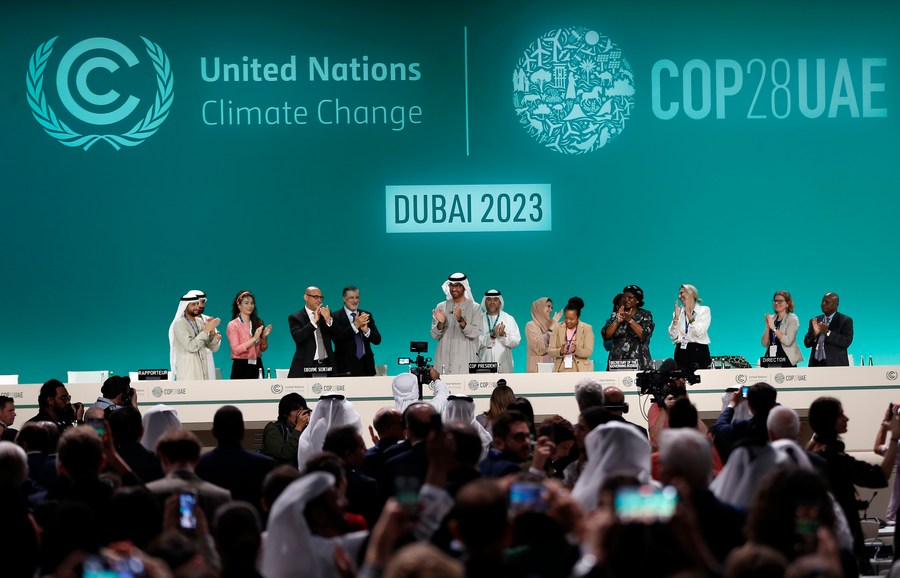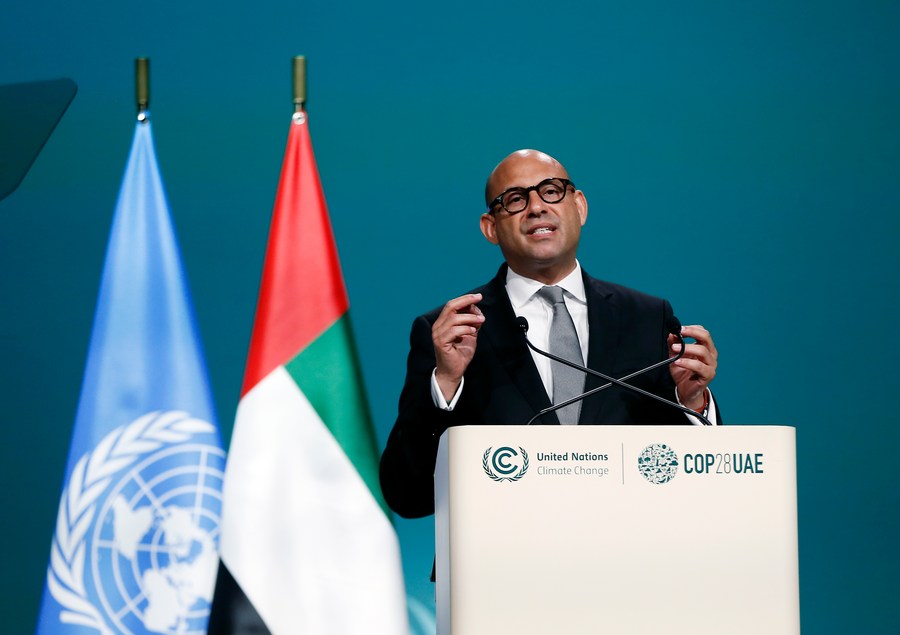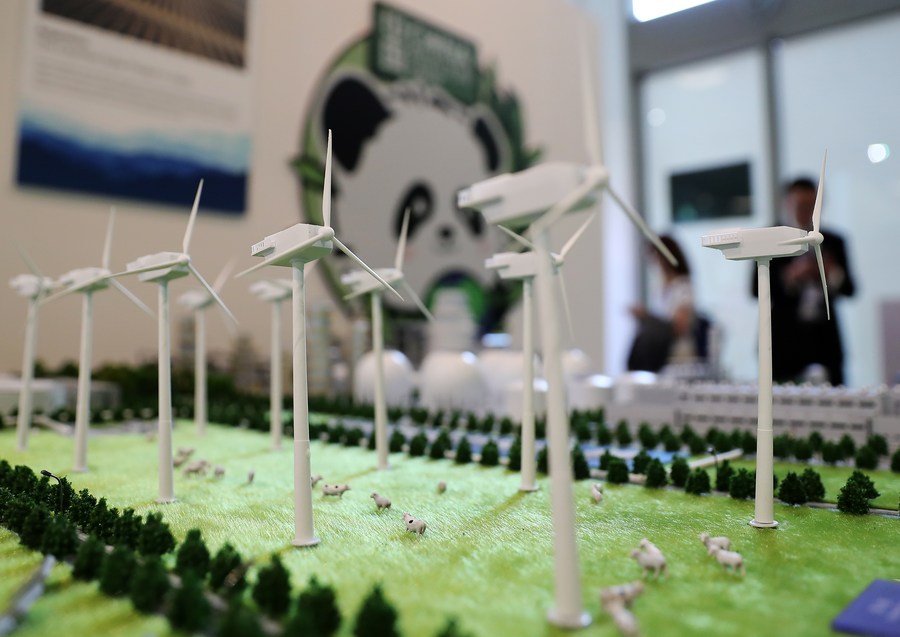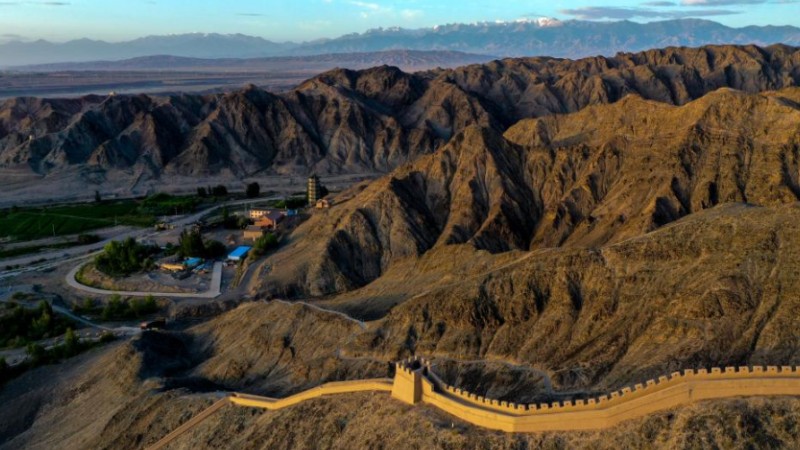UAE Consensus on global stocktake to guide future climate efforts
DUBAI, Dec. 14 (Xinhua) -- The two-week-long COP28, the 28th meeting of the Conference of the Parties to the United Nations Framework Convention on Climate Change, concluded here Wednesday and delivered a historic consensus to ratchet up global climate action.
COP28 was of milestone significance. It featured the largest-ever registered participant number of over 110,000, a first-ever response to the global stocktake of the Paris Agreement, and the historic inclusion of fossil fuels in a climate deal.
China has attached great importance to this conference and held over 100 side events to state the country's propositions and share its concepts, practices, and cutting-edge technologies in the green and low-carbon transition.
Zhao Yingmin, head of China's delegation to COP28, said the global stocktake summarized achievements and gaps in climate action, further consolidated the irreversible global trend of the green and low-carbon transition, and pointed out the direction for future efforts to close the gaps.

Attendees applaud after the announcement of the UAE Consensus during a closing plenary of the 28th session of the Conference of the Parties to the United Nations Framework Convention on Climate Change (COP28) in Dubai, the United Arab Emirates (UAE), Dec. 13, 2023. (Xinhua/Wang Dongzhen)
GENUINE STRIDES FORWARD
On Wednesday afternoon, COP28 President Sultan Ahmed Al Jaber announced the adoption of a final consensus on a "historic" climate deal for the summit.
"It is an enhanced, balanced but make no mistake, a historic package to accelerate climate action. It is the UAE Consensus," said Al Jaber at the closing plenary.
The consensus has put forward a slew of measures to close the gaps to 2030, regarding mitigation, adaptation, finance, and fossil fuels, among others, and has laid the ground for a swift, just, and equitable transition, underpinned by deep emission cuts and scaled-up finance.
This year's UN climate conference got off to a good start on its opening day by operationalizing the loss and damage fund, which was established in COP27 to support the nations that are particularly vulnerable to the adverse effects of climate change.
After two-week intensive consultations among nearly 200 parties, the summit had mobilized more than 85 billion U.S. dollars in funding and launched and supported 11 pledges and declarations.
These include declarations on food systems transformation, health, renewables and energy efficiency, in addition to initiatives to decarbonize heavy-emitting industries.
Parties also agreed on targets for the Global Goal on Adaptation (GGA) and its framework, which identify where the world needs to be to increase resilience to climate change. The GGA framework reflects a global consensus on adaptation targets and the need for finance, technology, and capacity-building support to achieve them.
COP28 also saw parties agree to Azerbaijan as the host of COP29 and Brazil as the COP30 host.
Despite the outcome delivered, it "needed to move the needle further," said UN Climate Change Executive Secretary Simon Stiell in his closing speech.
Financial pledges, a key enabler of climate action, are far short of the fund needed to support developing countries in implementing their national climate plans and adaptation efforts.
At the closing plenary, developing countries and climate change-vulnerable nations complained that their concerns have not been fully addressed, calling for developed countries to bear their due share of responsibility for climate response and walk the talk to lead global action.

UN Climate Change Executive Secretary Simon Stiell speaks during a closing plenary of the 28th session of the Conference of the Parties to the United Nations Framework Convention on Climate Change (COP28) in Dubai, the United Arab Emirates, Dec. 13, 2023. (Xinhua/Wang Dongzhen)
CHINA'S PROACTIVE ROLE
During the climate summit, China has been committed to its proactive role in global climate governance and has made continuous contributions to addressing the pressing climate challenge.
At a news briefing, China's special envoy for climate change Xie Zhenhua said China has made intensive consultations with all major parties to COP28 to make the summit a success by finding an agreement that is in line with the spirit of the Paris Agreement, reflects the general trend of energy transformation, and can map out the direction of future efforts as well as embody inclusiveness.
By stepping up efforts to accelerate its own green and low-carbon transition, China has brought the cost of wind power generation down by 80 percent, and photovoltaic power generation by 90 percent, laying a solid foundation for the large-scale deployment of renewable energy around the world.
China's concrete actions have won widespread recognition from COP28 delegates. IEA Executive Director Fatih Birol called China "a champion of the world in clean energy."
Erik Solheim, former UN under-secretary-general and former executive director of the UN Environment Programme, said that "for the green transformation of the world, China is the indispensable nation. Sixty percent of solar panels (globally), and green batteries, green cars, and green buses, etc. all are in one nation alone, China ... The power of China to help the world go green is enormous."
"China's achievement has been phenomenal. A lot of people outside of China perhaps don't realize the scale of the shift that is taking place," said Dominic Waughray, executive vice president of the World Business Council for Sustainable Development, who also expressed confidence that China's impressive strides in renewable energy and the electric vehicle revolution can help the world "fill the gap."

Attendees attend a side event at the China Pavilion during 28th session of the Conference of the Parties to the United Nations Framework Convention on Climate Change (COP28) in Dubai, the United Arab Emirates, Dec. 6, 2023. (Xinhua/Wang Dongzhen)
Truly, under the framework of South-South cooperation and Belt and Road cooperation, China is helping developing countries that are facing the arduous task of energy transformation.
According to China's delegation to COP28, as of November, China had signed 48 South-South cooperation documents on climate response with 40 developing countries, assisted in launching climate change mitigation and adaptation projects, and helped train officials and professional personnel specializing in climate response.
Bounkham Vorachit, minister of natural resources and environment of Laos, said, "China has become a global leader in utilizing green and low-carbon energies, as well as an active practitioner and supporter of South-South cooperation."
Phildah Kereng, Botswana's minister of environment and tourism, said: "By sharing expertise, providing financial support, and facilitating knowledge exchange, China contributes to global efforts in mitigating greenhouse gas emissions, fostering climate resilience, and promoting sustainable development in the context of climate change."
COOPERATION IS KEY
The COP28 presidency had faced "the most demanding COP agenda of all time," and there had been a deep split among the parties, said Al Jaber when briefing media on the climate talks' extending beyond the official deadline.
To facilitate the success of the summit, China and the United States have worked together in round-the-clock negotiations and provided some joint proposals to break the deadlock in talks, China's special envoy for climate change Xie told reporters at a joint press conference with his U.S. counterpart John Kerry.
For his part, Kerry said he agreed with China to maintain the dialogue on long-term climate plans and that the two countries wanted to "generate more effort in other countries" to come up with a global solution.
The COP28 presidency has been promoting environmental multilateralism and urging the unity of all parties in this difficult time.
Al Jaber has repeatedly called on "everyone to come prepared with solutions, to come ready to be flexible, to accept compromise, to rise above self-interests and to start thinking (about) the common good."
"We are standing at a critical juncture in our shared journey towards a just and inclusive energy transition," said Rola Dashti, executive secretary of the UN Economic and Social Commission for Western Asia, stressing that "this formidable task cannot be achieved by any single organization or nation alone."
China upholds the principle of common but differentiated responsibilities and respective capabilities in dealing with energy transition and consistently advocates for finding the greatest common denominator, setting each country's energy, food and economic security as a precondition.

This photo taken on Dec. 6, 2023 shows a model displaying wind turbine generators at the China Pavilion during the 28th session of the Conference of the Parties to the United Nations Framework Convention on Climate Change (COP28) in Dubai, the United Arab Emirates. (Xinhua/Wang Dongzhen)
"At every stage, climate action must stride forward side-by-side with human development, dignity and opportunity," said UN climate chief Stiell in his COP28 closing speech.
Also, within its means, China seeks to come up with a solution to move beyond the common stalemates over issues at stake, a solution that is pragmatic and exemplary and can be shared and replicated.
Photos
Related Stories
- Interview: First-ever global stocktake opens new chapter in global climate process, says head of China's delegation to COP28
- China, US work together for successful COP28: Xie Zhenhua
- Nation delivers climate message loud and clear
- COP28 delivers "historic" consensus to accelerate global climate action: president
- COP28 concludes with consensus on climate deal
Copyright © 2023 People's Daily Online. All Rights Reserved.









